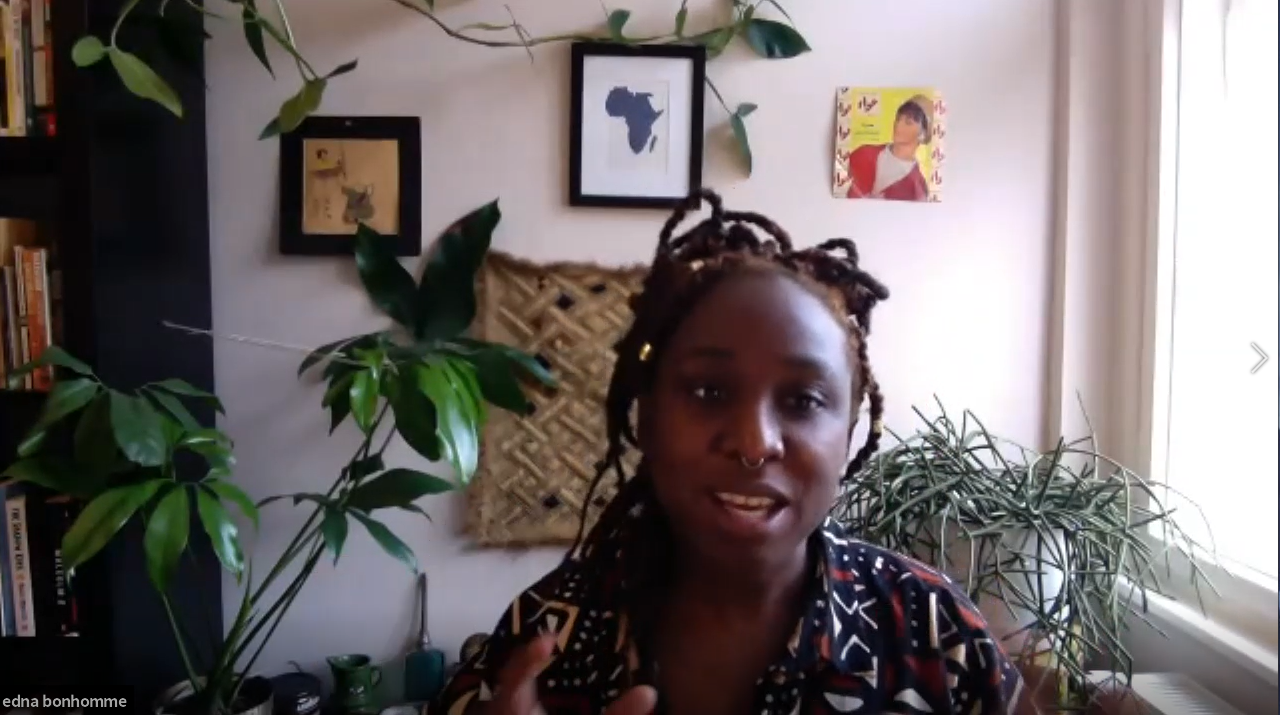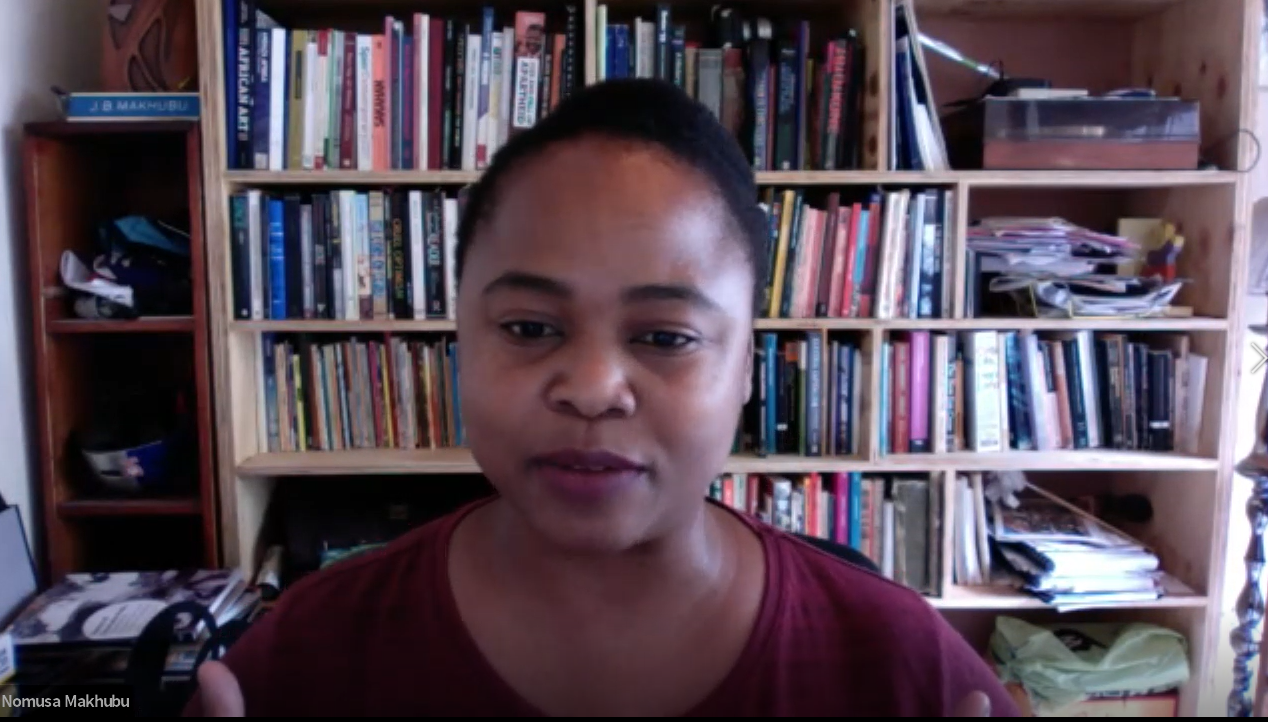Black Feminism, the Scholarly and the Curatorial - 26 March 2021

In this conversation we engaged with the black feminist intellectual enterprise and how Dr Edna Bonhomme’s work on health and healing expands and shifts through thinking in and with the curatorial. Our point of departure was a question that sits centrally in her practice, that is what makes people, and black folk especially, sick? Where do science and art meet in interrogating notions of health? What possibilities for healing can we find in the curatorial?
Dr Bonhomme’s talk, titled, “Imperial Fevers, Invisible Lives,” explored how epidemics aren’t just about the bacteria and viruses that coexist with us, but reflect the social divisions that push some people to the margins of society. Her premiere exhibition, Cartographies of Care with Nnenna Onuoha in 2020, charted the experience of African diasporic health in Berlin within and outside the German healthcare system. Whether it is the HIV/AIDS epidemic in Black American communities or the high incidence of maternal mortality for Black people, we have to reckon with how histories and legacies of inequality create the phenomenon of premature death. This talk examined these inequalities as it relates to sexual and reproductive health of Black women in the United States and beyond. The journal article, “Research in forced displacement : Guidance for a feminisit and decolonial approach,” (Lokot, M., Singh, NS., Undie, C. et. al. The Lancet, 397 (10274), (2021)) looks into this matter with attention to the inequalities of data and research brought to the fore with the Covid-19 pandemic, the topic of Bonhomme’s current research, “Race Against the Virus”.
Further reading:
Bonhomme, E. (2020, August 16). How the Myth of Black Hyper-Fertility Harms Us. Aljazeera Media Network Online.
Bonhomme, E. (2020, October 1). Covid Threatens to Worsen Disparities in Maternal and Reproductive Care. The Nation.
Chaudhuri, MM., Mkumba, L., Raveendran, Y., & Smith, R. (2021). Decolonising global health. BMJ Global Health, 6. 1-5.
Speaker Bio: Edna Bonhomme is a Historian of Science and Writer based in Berlin, currently a postdoctoral fellow at the Max-Planck-Institut für Wissenschaftsgeschichte. Dr Bonhomme completed her PhD in the History of Science from Princeton University, and a Master of Public Health from Columbia University. Working with sound, text, and archives, she explores contagion, epidemics, and toxicity through decolonial practices and African diaspora worldmaking. Using textual archives and oral histories she unpacks variant notions of sickness and health as well as the modalities of care that shape the possibility for repair. Her artistic language combines science studies with traditional healing elements. Her project “Black Health in Germany,” is part of her long-term research project that she started in 2019 with a growing collection/archive on the representation of Black health and healing in Germany. Her critical multimedia projects have been featured at Haus Kulturen der Welt (Berlin), alpha nova galerie futura (Berlin), and the Austrian Academy of Women Artists (Austria). She has also written for a wide range of academic journals and popular press.
Discussant Bio: Nomusa Makhubu is an Artist-Curator and Associate Professor at the Michaelis School of Fine Art at the University of Cape Town.
by Sonya Solanki
The Spirals talk ‘Imperial Fevers, Invisible Lives’ by Dr Edna Bonhomme, shone light on the intersections between colonialism and Black health, the importance of Black feminism, traditional healing and curatorial practices in the area of medicine. This reflection will unpack the cruciality of each of these, with a view on the type of curatorial practices that should be pursued for Black health to thrive in the South African context.

Pandemics and disease have a history of plaguing Black populations across the world. Noted further, is the persisting infection of African colonies by their colonial powers. An example of this includes the Democratic Republic of Congo where Belgian colonialism severely weakened the public health system. It was also a Belgian citizen who carried COVID-19 into the country (Bonhomme, 2019; Bonhomme, 2020). In South Africa, this narrative has also endured since colonialism with the smallpox epidemic of 1713, for instance, disproportionally affecting the Khoisan population versus the White colonists (South African History Online, 2011).
South Africa’s first major national health disaster, the Spanish Influenza of 1918, was brought to the country by WWI soldiers. Many of these, Black soldiers who served as periphery support soldiers, were unable to bear arms under South African legislation (Phillips, 2020). How ironic then, that in the contemporary the COVID-19 virus was first introduced to South Africa by a Euro-travelled male, and that township communities have been the most severely affected – ultimately causing an unprecedented economic constriction, widespread loss of jobs, homes, and collective mental instability (Patel & Steinhauser, 2020; Wiysonge, 2020). Women are particularly affected, being further entrenched in the informal labour market, more likely to be living in poverty and earning less than male counterparts (Gordon & Parry, 2020).

Both Dr Edna Bonhomme and Associate Professor Nomusa Makhubu alluded to curatorial practices in Black health feminism as one of the answers to this question, and the notion of care as being an integral aspect of Black, queer and feminist tradition. Dr Bonhomme and Nnena Onuoha’s Cartographies of Care trace the modalities of healing found in the Afrodiasporic community through ancestral archives, the healing arts and the imagining of Black futures (Contemporary And, 2020). Ingrid Lafleur’s ongoing exhibitions in Afrofuturism (such as Manifest Destiny) seek to curate spaces in which the imagining of Black destiny may be shifted, and also draws on the importance of ancestral wisdom and spiritual technology. She challenges the perception of Black bodies being unhealthy, and the unhealthy relationship with Black bodies (Espy, 2019; Faramarzi & Nkinzingabo, n. d.). Audre Lorde’s Cancer Journals is an important example in the archiving of lived Black queer, female experience with disease and the overcoming of female defeat in the wake of breast prosthesis (Zakaria, 2016). Toni Morrison’s Home although fictional, draws important parallels between the ignominies of slavery, its effect on Black mentalities and the traditional healing power of women, a vestige of resistance to the violence of the patriarchal modern medical industry (Penguin Random House, 2021).

In South Africa, traditional healing and the drawing of ancestral wisdom has long fallen under the polemic of colonial stigmatization of Black magic, heresy and the sangoma. Khoisan thought was transferred through mythology, stories and rituals that were united in the belief of the spiritual universe and the idea that human and spiritual realms should be in reciprocal communication. Today, the sangoma’s deliverance of muthi (traditional medicine), is still based on divination, occult readings, and dream interpretation. Despite extensive Western imperialist legislation against this practice, the associations of indigenous healing with disease, and the difficulties with integrating African Christian and spiritual beliefs, indigenous healing remains an integral but eclipsed aspect of Black South African culture (Black, 2016; Wallace, 2015).
With indigenous and traditional healing in South Africa still falling into a place of shadow and doubt, are there ways in which we can shift this narrative through work in the curatorial? Can we take inspiration from the work of Dr Bonhomme and Toni Morrison in creating archives that depict the healing powers of the sangoma, and facilitate the de-stigmatization of the supernatural, herbalism and magic? How can we curate safe spaces and continuous discourse that free Black women from the burden of caring, the legacy of domination and the misogyny associated with ancestral healing- to being cared for, understood and unrestricted to explore the art of healing Black bodies?
Watch the recording of the discussion between Dr Bonhomme, Dr Makhubu and researchers from the affiliated institutions, here.
Sonya Solanki is an Honours in Curatorship student at the Michaelis School of Fine Art. Through her research, she hopes to uncover the meaning and importance of deeply creative acts to the individual and collective feminine journey, using her experience in dance as a foundation for this.